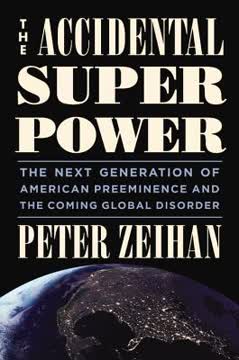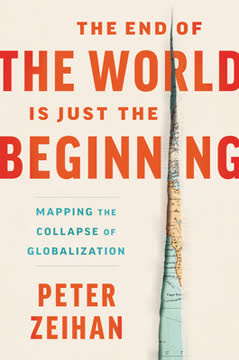Key Takeaways
1. Geography's Enduring Influence on National Success
The balance of rivers, mountains, oceans, plains, deserts, and jungles massively influences everything about both the human condition and national success.
Geopolitics matters. The book emphasizes that geography is a primary, often overlooked, driver of national success. Factors like navigable rivers, defensible borders, and access to resources shape a nation's economic, military, and cultural development. Ignoring these geographical realities leads to flawed strategies and inaccurate predictions.
Balance of transport. Successful countries possess a balance of easy internal transport (rivers, plains) and difficult external transport (mountains, deserts, oceans). This allows for internal trade and cohesion while providing natural defenses. Egypt's Nile River and the United States' Mississippi River system are prime examples of internal waterways fostering economic growth and national unity.
Beyond determinism. While geography provides a foundation, it is not deterministic. Human ingenuity and technology can alter the impact of geography, but understanding these underlying influences is crucial for navigating the complexities of international relations.
2. The American Superpower: An Accidental Advantage
Since the root of American power is geographic and not the result of any particular plan or ideology, American power is incidental. Even accidental.
Geographic blessings. The United States possesses a unique combination of geographic advantages, including the world's most extensive navigable river system, vast arable land, and natural defenses. This has led to unparalleled economic prosperity and military dominance.
The Mississippi advantage. The Mississippi River system, combined with the Intracoastal Waterway, provides the U.S. with more internal waterways than the rest of the planet combined. This facilitates cheap transport, internal trade, and national unity.
Accidental superpower. The U.S. didn't intentionally set out to become a superpower. Its geographic advantages, combined with historical circumstances, led to its rise. This "accidental" nature of American power makes it difficult to predict its future actions based on ideology or grand strategy.
3. Bretton Woods: The U.S. Deal That Reshaped the World
The Americans offered to use their navy to protect all maritime trade, regardless of who was buying or selling the cargoes.
Post-war order. After World War II, the U.S. established the Bretton Woods system, offering free trade and security guarantees to participating nations. This created a U.S.-led global order that fostered unprecedented economic growth and stability.
Strategic rationale. The U.S. offered this deal not out of altruism, but to contain the Soviet Union. By providing economic and military security, the U.S. created a powerful alliance network that encircled the Soviet bloc.
The end of an era. The Bretton Woods system is now winding down as the U.S. faces new challenges and priorities. This will have profound consequences for the global economy and international relations.
4. Demographic Shifts: The Coming Economic Roller Coaster
What is immediately rewarded is repeated. What is immediately punished is avoided.
Aging populations. Many developed countries, including Japan and much of Europe, are facing rapidly aging populations and declining birth rates. This will lead to economic stagnation, increased social welfare costs, and political instability.
The demographic dividend. The "demographic dividend" refers to the economic boost that occurs when a country has a large proportion of working-age people and a smaller proportion of dependents (children and retirees). This dividend is now coming to an end in many countries.
The U.S. exception. The U.S. is relatively better positioned demographically than most other developed countries due to higher birth rates and immigration. This will give the U.S. a competitive advantage in the coming decades.
5. Shale Revolution: Reshaping U.S. Energy Independence
First, since the root of American power is geographic and not the result of any particular plan or ideology, American power is incidental. Even accidental.
Energy independence. The shale revolution has transformed the U.S. into the world's largest energy producer, reducing its dependence on foreign oil and reshaping global energy markets. This has significant geopolitical implications.
Economic benefits. Shale energy has created jobs, lowered energy prices, and boosted manufacturing in the U.S. It has also reduced the U.S. trade deficit and increased its economic competitiveness.
Environmental concerns. Fracking, the technology used to extract shale energy, has raised environmental concerns about water usage, contamination, and methane leakage. However, the industry is working to address these concerns and improve its environmental performance.
6. The Return of Geopolitics: A World in Disorder
In 2014, we’re not witnessing the beginning of the end of American power, but the end of its beginning.
End of an era. The free trade era created by Bretton Woods is winding down, leading to a more fragmented and competitive world. The U.S. is becoming less interested in maintaining the global order and more focused on its own interests.
Power vacuums. As the U.S. withdraws from its role as global policeman, regional powers will emerge to fill the power vacuums. This will lead to increased competition, conflict, and instability in many parts of the world.
A new world order. The world is entering a period of profound change, with new power dynamics and shifting alliances. Understanding these trends is crucial for navigating the challenges and opportunities of the future.
7. Alliances in the New Era: Partners and Aggressors
The conventional contemporary wisdom isn’t simply wrong, it’s laughably so.
Strategic partnerships. In the new era, the U.S. will focus on building strategic partnerships with countries that share its interests and values. These partnerships will be based on mutual benefit and a willingness to share the burden of maintaining security and promoting prosperity.
Aggressive powers. Some countries, driven by ambition or desperation, will seek to expand their influence and challenge the existing order. These "aggressive powers" will be a source of instability and conflict in the coming decades.
The American advantage. The U.S. will retain its position as the world's most powerful nation due to its geographic advantages, economic strength, and military capabilities. However, it will need to adapt its strategy to the new realities of a more multipolar and competitive world.
8. The Looming North American Drug War
The conventional contemporary wisdom isn’t simply wrong, it’s laughably so.
Cartel expansion. As the U.S. withdraws from its role as global policeman, regional powers will emerge to fill the power vacuums. This will lead to increased competition, conflict, and instability in many parts of the world.
Economic integration. The U.S. will retain its position as the world's most powerful nation due to its geographic advantages, economic strength, and military capabilities. However, it will need to adapt its strategy to the new realities of a more multipolar and competitive world.
The American advantage. The U.S. will retain its position as the world's most powerful nation due to its geographic advantages, economic strength, and military capabilities. However, it will need to adapt its strategy to the new realities of a more multipolar and competitive world.
9. Europe's Impending Crisis: A Continent Adrift
The conventional contemporary wisdom isn’t simply wrong, it’s laughably so.
Demographic decline. As the U.S. withdraws from its role as global policeman, regional powers will emerge to fill the power vacuums. This will lead to increased competition, conflict, and instability in many parts of the world.
Economic stagnation. The U.S. will retain its position as the world's most powerful nation due to its geographic advantages, economic strength, and military capabilities. However, it will need to adapt its strategy to the new realities of a more multipolar and competitive world.
The American advantage. The U.S. will retain its position as the world's most powerful nation due to its geographic advantages, economic strength, and military capabilities. However, it will need to adapt its strategy to the new realities of a more multipolar and competitive world.
10. China's Fragile Rise: A House of Cards
The conventional contemporary wisdom isn’t simply wrong, it’s laughably so.
Demographic decline. As the U.S. withdraws from its role as global policeman, regional powers will emerge to fill the power vacuums. This will lead to increased competition, conflict, and instability in many parts of the world.
Economic stagnation. The U.S. will retain its position as the world's most powerful nation due to its geographic advantages, economic strength, and military capabilities. However, it will need to adapt its strategy to the new realities of a more multipolar and competitive world.
The American advantage. The U.S. will retain its position as the world's most powerful nation due to its geographic advantages, economic strength, and military capabilities. However, it will need to adapt its strategy to the new realities of a more multipolar and competitive world.
Last updated:
FAQ
What’s The Accidental Superpower by Peter Zeihan about?
- Geography shapes global power: The book argues that geography is the fundamental driver of national success, influencing economics, politics, and military strength.
- American preeminence explained: Zeihan details how the United States’ unique geographic advantages made it the world’s dominant superpower.
- Forecast of global disorder: The book predicts the unraveling of the American-led global order (Bretton Woods system) and the rise of a more chaotic, fragmented world.
- Country and regional analysis: It examines how key players like Russia, China, Europe, and North America will fare as the old order dissolves.
Why should I read The Accidental Superpower by Peter Zeihan?
- Fresh geopolitical perspective: Zeihan uses a geography- and demography-first approach, avoiding ideological bias and focusing on tangible, physical realities.
- Insight into future trends: The book prepares readers for the coming era of regional conflicts, economic fragmentation, and shifting alliances.
- Practical framework for analysis: Readers gain tools to understand international relations, economic trends, and the forces shaping the next generation.
- Relevance to current events: The book’s predictions and frameworks help make sense of ongoing global shifts and uncertainties.
What are the key takeaways from The Accidental Superpower by Peter Zeihan?
- Geography is destiny: National power and prosperity are rooted in geographic features like rivers, plains, and secure borders.
- American dominance is accidental: The U.S. became a superpower not by design, but due to unmatched geographic and demographic advantages.
- Global order is unraveling: The American-led system of free trade and security is ending, leading to increased disorder and regionalization.
- Demographics and energy matter: Aging populations and the U.S. shale revolution will reshape global economics and power structures.
What are the best quotes from The Accidental Superpower by Peter Zeihan and what do they mean?
- “Geography is the mother of strategy.” This highlights Zeihan’s core thesis that physical location and features dictate national fortunes.
- “The United States is the only truly accidental superpower.” Zeihan argues that America’s rise was not planned, but a result of unique geographic luck.
- “The world we know is ending, and a new one is being born.” This quote encapsulates the book’s forecast of the end of the Bretton Woods era and the coming global disorder.
- “Demographics are destiny.” Zeihan emphasizes that population structure will drive economic and political outcomes in the coming decades.
What are the main concepts and methods used in The Accidental Superpower by Peter Zeihan?
- Balance of transport: The ease of internal movement (rivers, roads) and difficulty of external invasion (mountains, oceans) shape national unity and security.
- Deepwater navigation: Mastery of oceanic trade and military projection is a key to global influence.
- Industrialization and capital generation: The ability to industrialize and accumulate capital determines economic and military strength.
- Demographic inversion: Aging populations in developed countries will shrink labor pools and strain economies, while younger populations offer future growth.
How does [Author] Peter Zeihan define geopolitics in The Accidental Superpower?
- Geopolitics as place-based analysis: Zeihan defines geopolitics as the study of how geography impacts everything from culture to security.
- Physical factors over ideology: He prioritizes tangible features—rivers, mountains, climate—over political systems or ideologies in explaining national outcomes.
- Predictive power: By focusing on geography, Zeihan claims to offer a more reliable framework for forecasting global trends and crises.
How does [Author] Peter Zeihan explain the rise of the United States in The Accidental Superpower?
- Unmatched waterway network: The U.S. has the world’s largest system of navigable rivers and protected coastlines, enabling cheap, efficient transport and economic unity.
- Vast, fertile land: The overlap of arable land and waterways supports massive agricultural output and a large, integrated consumer base.
- Natural geographic buffers: Oceans, deserts, and friendly neighbors make the U.S. nearly impossible to invade, providing security and stability.
- Industrial and maritime advantages: Abundant resources, ports, and infrastructure allow the U.S. to project power globally without overextension.
What was the Bretton Woods system and why is it important in The Accidental Superpower by Peter Zeihan?
- Foundation of postwar order: The 1944 Bretton Woods Conference created the World Bank, IMF, and a system of free trade underpinned by American naval power.
- American strategic generosity: The U.S. offered open markets and security to allies and former enemies, subsidizing global economic recovery and growth.
- Enabled global prosperity: This system allowed Europe, Japan, and others to rebuild and thrive under American protection.
- Now unraveling: Zeihan argues that the U.S. is withdrawing from this role, leading to the end of the global order it created.
How does [Author] Peter Zeihan analyze the impact of demographics in The Accidental Superpower?
- Demographic groups and roles: Populations are divided into children, young workers, mature workers, and retirees, each affecting economic growth differently.
- Boomer generation effects: The Baby Boomers fueled a capital surplus and consumption boom, driving global growth and cheap credit.
- Aging crisis ahead: As Boomers retire, capital will shrink, credit will tighten, and economic growth will slow, especially in developed countries.
- U.S. demographic exception: The U.S. benefits from a younger, growing population due to immigration and higher birth rates, unlike most other developed nations.
What is the significance of the shale energy revolution in The Accidental Superpower by Peter Zeihan?
- Energy independence: The U.S. shale boom has made America the world’s largest energy producer, reducing reliance on unstable foreign sources.
- Economic and strategic benefits: Cheap, abundant energy strengthens the domestic economy and reduces vulnerability to global disruptions.
- Unique American advantages: The U.S. has the capital, labor, legal framework, and infrastructure to exploit shale resources, a combination rare elsewhere.
- Global implications: Shale energy reduces U.S. interest in global energy markets, potentially fracturing the old order and shifting alliances.
How does [Author] Peter Zeihan predict the future of Russia, China, and Europe in The Accidental Superpower?
- Russia’s demographic and territorial decline: Russia faces population collapse and struggles to maintain control over its vast borders, especially Ukraine and the Caucasus.
- China’s fragile unity: China’s geographic and ethnic diversity, aging population, and dependence on exports make it vulnerable to fragmentation and crisis.
- Europe’s disintegration: The end of American security guarantees will revive old rivalries, financial crises, and demographic decline, leading to political fragmentation.
- Germany’s export dilemma: Germany’s reliance on exports and distant resources makes it especially vulnerable in a post-Bretton Woods world.
Who are the key American allies and partners in the new global disorder according to The Accidental Superpower by Peter Zeihan?
- North American core: Canada and Mexico are the U.S.’s closest economic and security partners, with integrated trade and shared borders.
- European gateways: Denmark and the Netherlands control critical trade routes and are staunchly pro-American.
- Asian strategic partners: Thailand, Myanmar, Taiwan, South Korea, and Singapore are vital for U.S. interests in Asia.
- Challenged and shifting allies: Countries like Cuba, Venezuela, and the UK face pressures to align with the U.S. or adapt to new realities.
What does [Author] Peter Zeihan say about migration, militancy, and terrorism in the coming global disorder in The Accidental Superpower?
- Migration driven by instability: Aging populations and failing states will push many to migrate, but most movement will be regional due to cost and security.
- Militancy over terrorism: Localized militancy will rise in failed states, while transnational terrorism will be constrained by geography and state strength.
- Key hotspots: Pakistan’s border region and Russia’s Caucasus are likely sources of militant activity with regional impact.
- U.S. insulation: The U.S. will remain relatively insulated from direct impacts due to its geography, alliances, and ability to attract skilled migrants.
Review Summary
The Accidental Superpower received mixed reviews, with praise for its engaging analysis of geopolitics, geography, and demographics. Readers appreciated Zeihan's insights on America's advantages and global predictions. However, some criticized his oversimplification, American exceptionalism, and neglect of cultural factors. The book's predictions, including Russia's invasion of Ukraine, impressed many readers. Critics noted the absence of nuclear threats and internal US conflicts in his analysis. Overall, readers found the book thought-provoking, even if they disagreed with some conclusions.
Similar Books
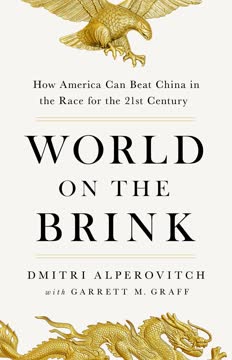


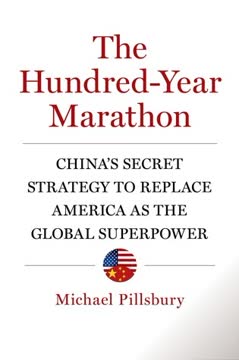

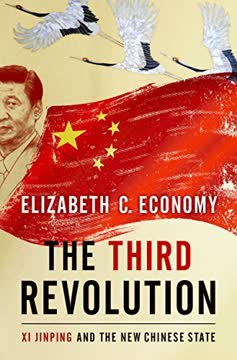

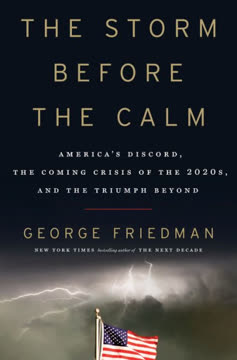
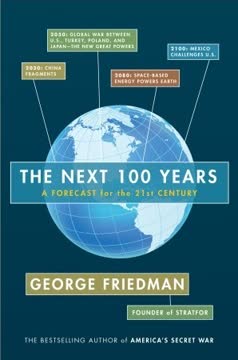
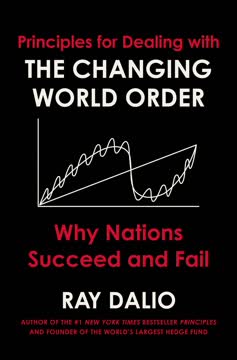
Download PDF
Download EPUB
.epub digital book format is ideal for reading ebooks on phones, tablets, and e-readers.
